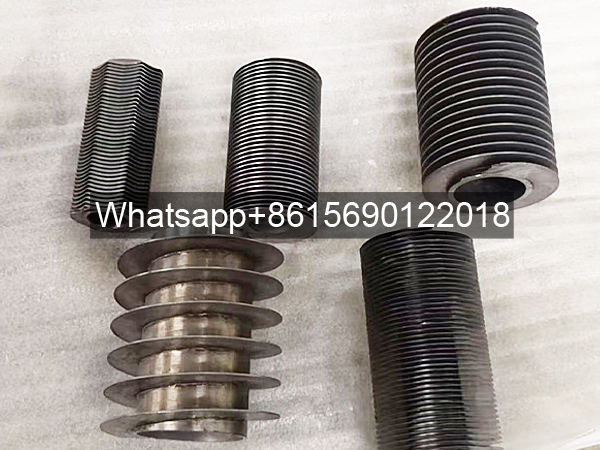Seamless Fin Tube

Seamless fin tubes are heat-enhancing components with fins added to the surface of seamless steel tubes through high-frequency welding and integral rolling.
They are widely used in industrial heat exchange, waste heat recovery, and heating systems.
Email:datangfintube@gmail.com
Whatsapp:+86 15690122018
I. Structural Characteristics of Seamless Fin Tubes
Base Tube Material
Using 20# carbon steel, 304/316 stainless steel, or seamless alloy steel tubes (such as 12Cr1MoV), with a wall thickness of 3-10mm. The weld-free structure can withstand temperatures exceeding 400°C and pressures of 2.5-10MPa.
Finning Process
High-frequency welding: Highly automated, tightly bonded fins to the base tube, and low thermal resistance.
Integral rolling: Three-roll cross-rolling achieves seamless bonding, resulting in higher mechanical strength.
Spiral/Longitudinal Fins: Spiral fins are suitable for gas heat exchange, while longitudinal fins are suitable for high-pressure fluids.
II. Core Advantages of Seamless Finned Tubes
High-Efficiency Heat Transfer: The fins increase the surface area by 3-8 times, increasing heat transfer efficiency by over 40% compared to plain tubes.
Pressure and Temperature Resistance: Seamless base tubes eliminate the risk of weld cracking and offer a lifespan 30% longer than welded tubes.
Environmental Adaptability: Customizable anti-corrosion coatings (such as galvanizing and aluminum cladding) are available, making them suitable for dusty, oily, and corrosive environments.
Datang Fin Tube Technical Parameters
| PRODUCT | TYPE | TUBE MATERIAL | FIN MATERIAL | TUBE SIZE | FIN SIZE |
| Heat Exchanger Finned Tube | Extruded Fin Tube | All Kind of Material can be applied | Aluminum A1100 | 15.88~50.8 | 7~11.5FPI |
| Fin Height Max 16mmH | |||||
| L-Foot Fin Tube | All Kind of Material can be applied | Copper C1100, C1220 | 12.70~50.8 | 7~11.5FPI | |
| (Wrap On Type) | Fin Height Max 16mmH | ||||
| G-Fin Tube (Embedded Type) | Aluminum A1100, A1050, A1060 | ||||
| High Frequency Welded Finned Tube | A179 Carbon Steel Tube | Carbon Steel Tube | 12.70~160 | 1.5~7FPI | |
| Stainless Steel Tube | Stainless Steel Tube | 0.8~3.2mm. Thickness | |||
| Alloy Steel Material | Alloy Steel Material | ||||
| Integral Copper & Copper Alloy High Finned Tube | C12200, C11000, C70600 | C12200, C11000, C70600 | 15.88~22.23 | 5~9FPI | |
| Max 12mm. H | |||||
| Oval Finned Tube | Carbon Steel Tube | Carbon Steel Tube | All Size Available | 5~15FPI | |
| Stainless Steel Tube | Stainless Steel Tube | ||||
| Alloy Steel Material | Alloy Steel Material | ||||
| Copper & Copper Alloy Tube | Copper & Copper Alloy Tube | ||||
| Monometallic Fin Tube | Low Fin Tube | Carbon Steel, stainless steel, titanium, copper, brass, nickel alloy, etc. | — | 9.52~40 | 12, 16, 19 28 FPI, etc. |
| Turbo-C Tube | |||||
| Turbo-E Tube | |||||
| Corrugated Tube | All Kind of Material | — | 6.35~40 | 2~9FPI |
Seamless Fin Tube Applications in Industrial Boilers
As a core component in economizers and air preheaters, it recovers flue gas waste heat and reduces exhaust temperatures to below 120°C. A single 300MW unit saves approximately 800 tons of coal annually.
Seamless Fin Tubes for Workshop Heating
Heating via steam or thermal oil, suitable for irregular factory spaces, with a heat dissipation area of 50-200 m2 per unit
Seamless Fin Tubes for Petrochemicals
Used for crude oil heating (temperature control at 50-60°C) and reactor cooling. 316L material resists sulfide corrosion
Seamless Fin Tubes are used in food processing
Precise temperature control is provided during baking and fermentation, and the seamless structure prevents leakage and contamination.
Types of Anti-Corrosion Coatings for Seamless Fin Tubes
1. Metal-Based Anti-Corrosion Coatings
Galvanized Coatings
Hot-dip galvanizing: The zinc layer is 50-100μm thick and protects the substrate through the sacrificial anode effect. It offers salt spray corrosion resistance of over 5,000 hours and is suitable for outdoor environments such as power plants and chemical plants.
Electrogalvanizing: The zinc layer is thinner (5-20μm) and has a smooth appearance. It is mostly used indoors or in low-corrosion environments.
Stainless Steel Coating
Using a base material of austenitic stainless steel such as 304 or 316L, this seamless structure is achieved through high-frequency welding or integral rolling. It offers acid and alkali corrosion resistance (pH 2-12) and a lifespan of 20-30 years, making it suitable for high-end applications such as food and marine applications.
II. Organic Polymer Coating
Epoxy Resin Coating
Epoxy coal tar: Combines high strength and insulation, is water- and heat-resistant, and is suitable for underwater pipelines.
Epoxy powder: Spray-coated to form a continuous anticorrosive film, suitable for highly saline soils or desert environments.
Polyolefin Coating
3PE Anticorrosive Layer: A globally recognized pipeline corrosion protection solution that combines epoxy powder, adhesive, and polyethylene for excellent impermeability.
Polyethylene Coating: A thermoplastically molded rigid shell with high mechanical strength and a wide operating temperature range.
Plastic Spray Coating
Plastic powder cures at high temperatures, offering low cost and convenient application, and excellent corrosion resistance and insulation.
3. Special Functional Coatings
Ceramic Coatings
High temperature resistance (1200°C) and strong wear resistance make them suitable for extreme environments such as waste incinerators.
Teflon Coatings
Extremely low surface energy, resistant to organic solvents, commonly used in the pharmaceutical industry.
Glass Flake Coatings
A physical barrier blocks the penetration of corrosive media, resisting sulfur dioxide corrosion in flue gas heat dissipation in desulfurization towers.
4. Traditional Coatings
Silver Powder Paint: Contains resin and metallic pigments, offering both corrosion protection and aesthetics. Coating thickness uniformity must be controlled.
Fluorocarbon/Silicone Coatings: Excellent weather resistance, suitable for environments with strong UV rays or chemical corrosion.
